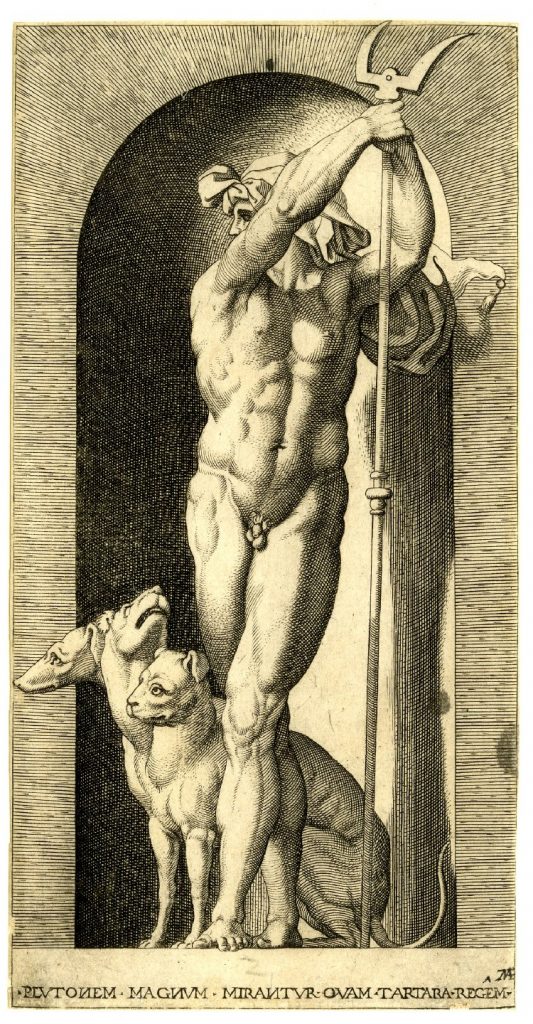More often than not, ancient Greek mythology (religion) served to explain a series of legends. Different from modern religions such as Christianity, Judaism, or Islam, ancient Greek religion was an anthropomorphic polytheism, meaning that ancient Greeks believed in a multitude of individual divine figures that took on human forms and emotions.1 Furthermore, ancient Greek mythology lacked much of the asceticism and mystical enthusiasm that is more commonly seen in modern religions. Most of the highly developed anthropomorphic and comparative rationalism of the ancient Greek religious thought can be accredited to Homer with the aid of his Iliad and Odyssey.2
The people of the ancient Greek civilization were often in a state of weakness under the power of nature; therefore, they relied heavily on the divine individuals of Olympus. Why? They believed that the forces of nature were under the control of their gods. In short, the relationship between humans and divine beings was that of a retribution justice.3 If humans did anything to offend the gods, then those gods would strike back in some sort of fashion to restore justice.4 Therefore, humans were constantly looking to please the gods in fear of their wrath.
Out of the ancient Greek mythology came the god of the dead and the underworld, Hades. Hades had five other siblings: Zeus, Poseidon, Demeter, Hera, and Hestia, and they were all children of Cronus and Rhea.5 After defeating their parents (the Titans), Hades drew lots with Zeus and Poseidon to gain their respective domains. Hades was commonly thought to be a cold god, but he was never considered to be an evil divine figure. Furthermore, it is important to note that his realm, the underworld, should not be associated with the hell of Christianity.6 However, Hades was for the most part feared by all. Another name for the ancient Greek god was Ploutos and later adopted by the Romans as Pluto.7

The god of the underworld was the husband of Persephone (Zeus’s and Demeter’s daughter). Although she was Hades’ wife, she only lived with him during the winter time.8 Persephone was the divine goddess of agriculture and fertility. Therefore, the ancient Greeks accredited the change in nature (winter) to Persephone moving to the underworld. Persephone was unable to stay with Hades at all times due to interference from her mother Demeter. Zeus, however, was okay with the marriage of Hades and Persephone. Therefore, in order to set up the marriage, Zeus had to trick Persephone, so she could be abducted by Hades.9 However, Demeter interfered, and that is why Persephone spends half of the year with Demeter and the other half with Hades.
Furthermore, it is important to note the Greek perspective of the afterlife. Perspectives about the afterlife varied from each other based on their region in Greece as well as their time period in Greek history. The consensus was that the underworld was neither heaven nor hell.10 The sense that exists within Christianity, for example, was not present during the time of the ancient Greeks. Although Tartarus was present as a location within the underworld, the Greeks would not compare it to the equivalent of Christian hell. The way the Greeks saw it, the underworld was a place that everyone ended up after death.11 However, there were a few, including the philosopher Epicurus, that believed that the underworld did not exist at all. He believed that when the body died, the soul died with the body as well.12 A good portion of Greeks refused to believe such a pessimistic perspective of the afterlife. However, even the Greek traditional perspective of the underworld was not as popular despite many Greeks believing in it.
- Funk & Wagnalls New World Encyclopedia, 2016 s.v., “Greek Religion and Mythology.” ↵
- Funk & Wagnalls New World Encyclopedia, 2016 s.v., “Greek Religion and Mythology.” ↵
- Funk & Wagnalls New World Encyclopedia, 2016 s.v., “Greek Religion and Mythology.” ↵
- Funk & Wagnalls New World Encyclopedia, 2016 s.v., “Greek Religion and Mythology.” ↵
- Salem Press Encyclopedia, January, 2015, “Hades (deity),” by Joseph, Michael, DMin. ↵
- Salem Press Encyclopedia, January, 2015, “Hades (deity),” by Joseph, Michael, DMin. ↵
- Salem Press Encyclopedia, January, 2015, “Hades (deity),” by Joseph, Michael, DMin. ↵
- Salem Press Encyclopedia, January, 2015, “Hades (deity),” by Joseph, Michael, DMin. ↵
- Salem Press Encyclopedia, January, 2015, “Hades (deity),” by Joseph, Michael, DMin. ↵
- The Greenhaven Encyclopedia of Ancient Greece, 2007, s.v. “Underworld,” by Robert B. Kebric. ↵
- The Greenhaven Encyclopedia of Ancient Greece, 2007, s.v. “Underworld,” by Robert B. Kebric. ↵
- The Greenhaven Encyclopedia of Ancient Greece, 2007, s.v. “Underworld,” by Robert B. Kebric. ↵



186 comments
Montserrat Moreno Ramirez
Very interesting article, the most surprising fact was that the underworld is not to be considered or associated with the hell of Christianity which is a mistakes that almost everyone makes, or at least I think so. Hades life seems that it was full of mystery for example it’s shocking but at the same time incredible how Persephone was tricked to marry Hades and that she only lives in the underworld in winter.
I found this article fascinating.
Noah Bolhuis
Having such a negative view on the afterlife must have meant that the ancient Greeks dreaded death, and that at no matter what age the thought of dying and either going to Hades or all consciousness must have shook them to the core. I would think that that thought would ruin any good day, as if is the lingering feeling that death in inevitable, and when it happens then that’s it, either suffering forever or absolute nothingness. I did find it interesting that all these religions listed do have a similar view of what happens after death. All religions acknowledge that there must be something more to life on earth, and find it fascinating that that has been in our faith since the ancient times and little has changed.
Stephanie Silvola
I have been always fascinated by the Greek mythology as well as Egyptian mythology. The different gods and goddesses and what each of them control was always something I found interest in. Hades is a maleficent character that should be appreciated more. As god of the Underworld, Hades was never displayed as a evil, although the story between him and Persephone has mixed opinions. The Underworld is of course depicted much different than Hell in the Christian religion. The Underworld was more like a passing into the afterlife and Hell was a designated stop that you stayed in for eternity.
Enrique Segovia
I liked this article because it was concise, and it made very interesting distinctions which I did not know about. For example, I found it interesting that the Greeks did not perceive the Underworld, which Hades is the ruler of, as Christians see it. We normally think of the Underworld as hell, but I learned that the Greeks did not acknowledge this place as Christians do with hell. The idea of afterlife is something Greeks really take into consideration, and this article deals with the topic deeply. Greek mythology has always been studied broadly by most people, so this article attracts reader’s attention, and it explains and idea brilliantly.
Lynsey Mott
I remember watching Hercules and feeling as though Hades was the bad guy all the time, and this article say different; that Hades wasn’t as bad as everyone makes him out to be. Its also different because a lot of people make Lucifer and Hades the same. Even though the underworld has nothing to do with Christianity and its sort of a halfway point from Heaven and Hell. I do find it interesting that although Zeus and Hades are siblings that Hades would marry his brothers daughter. I think I would want to delve into the story more to see how this was allowed.
Yadira Chavez
I have always liked the fact that in Greek Mythology, hell was never the frightening concept that keep other religions from doing wrong in their life. The believers of this mythology focused on being good people to have a good life, not a good afterlife. They feared not making the Gods happy, so they took care of the things they had and I do believe it is a nice philosophy to live by. This article is nicely put to inform but also draw the interest of the readers. I learned that the marriage of Persephone and Hades was planned by Zeus, which I never knew. Good job!
Maxx Arizmendi
I find Greek mythology to be fascinating to read, so I found this article to be an enjoyable read. I didn’t know that Zeus wanted Hades to abduct his daughter Persephone so she could marry Hades, and it is interesting how she only sees Hades during the winter time. At the time, people heavily relied on the gods of Greek mythology, so that was interesting to read why they were so trustworthy due to their wisdom.
Nathan Hartley
I thought I knew who Hades was from playing video games, movies, and TV. After reading this article however, I can see that I was clearly wrong. I always saw Hades as a Greek version of the devil, and the underworld as Hell, however I learned that the Greeks believed everyone went to the underworld regardless of if you were good or bad in life.
Kristy Feather
I find it fascinating how heavily people in the ancient Greek age relied on the gods. It’s amazing to think that there was so much blind trust into so many different gods for so many different things. At any given day someone could be going about their life normally, being a shepherd or working in a marketplace and then the next day when it would start to get cold and snow people would instantly assume that it was just because a goddess was descending to the underworld. To think that the Greek and Romans – two rather intelligent civilizations – would fall for the idea that weather was controlled by gods instead of nature; it’s nearly laughable.
Nathan Alba
I thought the article was quite informative. I did not know the Greek gods took wives. Not only that, but I now realize that the Greeks believed the forces of nature were controlled by the gods themselves. Also I did think the underworld was quite similar to the Christian Hell, but now I know the truth. Overall good article, topic was very interesting.